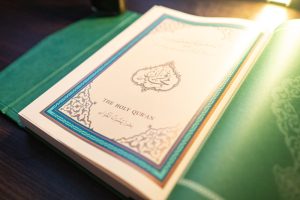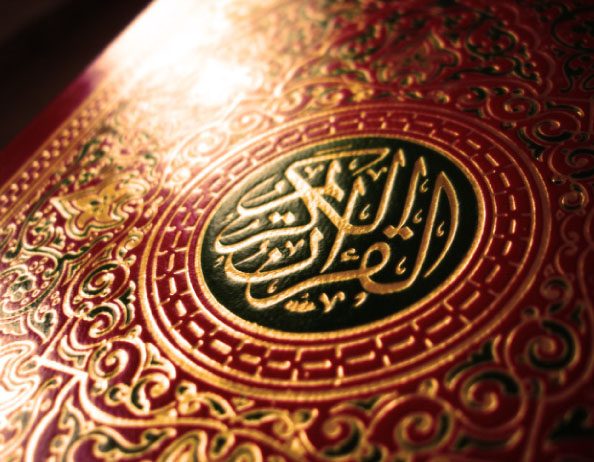
The Grand Exegesis
The Review of Religions is pleased to begin our serialisation of the first-ever full English Translation of At-Tafsīr-ul-Kabīr – The Grand Exegesis. This is the magnum opus of Hazrat Mirza Bashiruddin Mahmud Ahmad (ra), second Worldwide Head of the Ahmadiyya Muslim Community and whilst parts of it have previously been published in other works, such as the five-volume Holy Qur’an with English Translation and Commentary, it has never before been translated in its entirety.
This is one of the most insightful and in-depth commentaries of the Holy Qur’an ever written, and The Review of Religions has the honour to publish it for our English readers for the first time.
Translated by Murtaza Ahmad
Edited by The Review of Religions Translation Team
الْحَمْدُ لِلَّهِ رَبِّ الْعَالَمِينَ
All praise belongs to Allah alone, Lord of all the Worlds. (3)
(3) Key Word Analysis
(اَلْحَمْدُ al-Ḥamd)
Ḥamd means praise. In the Arabic language, several words are used to convey the meaning of praise: حمد ḥamd, مدح madḥ, شكر shukr, and ثناء thanā’. Allah the Almighty has not chosen the word ḥamd without reason. Shukr means to acknowledge and appreciate a favour. However, when this word is used in reference to Allah the Almighty, it only means appreciation. It is evident that the word ḥamd is more comprehensive than shukr because it does not merely signify acknowledgement of the favour; rather, it signifies the recognition of, expression of pleasure for, and appreciation for, all the intrinsic beauties of the praised object. Thus, it is a more comprehensive word on account of its meanings.
Another word is thanā’. Thanā’, in fact, denotes repetition. Praise is often referred to as thanā’, to indicate that when we sing the praises of someone, they become well-known and people speak highly of them.[i] It is evident that thanā’ means the widespread praise of something rather than having personally experienced [what is actually being praised]. Although thanā’ is referred to as a distinctive quality, this word does not shed light on the personal relationship between man and Allah the Almighty to the same degree as the word madḥ. The word thanā’ places greater emphasis on personal gratitude and thankfulness.
As for the word madḥ, this is used to refer to both genuine and unfounded praise. However, ḥamd is only used for genuine praise. Thus, a hadith [oral traditions of the Holy Prophet (sa)] states:
اُحْثُوا فِي وُجُوهِ الْمَدَّاحِينَ التُّرَابَ[ii]
‘Throw dust in the faces of those who flatter.’
Likewise, madḥ is also used in praise of such actions over which the doer has no control, whereas ḥamd is only used for those actions which are done wilfully and within one’s control.[iii] Thus, when used to express praise, the word ḥamd is superior to madḥ and is more appropriate in relation to Allah Almighty.
As mentioned above, thanā’ signifies praise that becomes well-known amongst people and this carries a distinctive feature. In this regard, it could be argued that the word ḥamd does not convey this meaning. The answer to this is that even this quality is contained in the expression الْحَمْدُ al-ḥamd, because the definite article ال (al) implies istighrāq [total inclusion] i.e., it encompasses everything and everyone within it. Therefore, الْحَمْدُ لِلَّهِ [All praise belongs to Allah] means that every kind of praise and that the praise of every individual is only due to Allah the Almighty and belongs to Him alone. These meanings embody the notion of praise that is widely acknowledged; in fact, this expression conveys the idea of the propagation of Allah’s praise even more so than the word thanā’.
(رَبٌّ rabb)
Rabb means إِنْشَاءُ الشَّيْءِ حَالًا فحَالًا إِلَى حَدِّ التَّمَامِ [creating something and gradually developing it until it reaches a state of perfection][iv]. It also conveys the meaning of tarbiyyah [bringing up; nurturing; moral training], particularly, when attributed to man. For instance, regarding one’s parents, the Holy Qur’an states:
رَبِّ ارْحَمْهُمَا كَمَا رَبَّيَانِي صَغِيرًا[v]
‘My Lord, have mercy on them even as they nourished me in my childhood.’
Rabb also denotes mālik [master].[vi] Similarly, it also means chief and leader.[vii] For example, the Holy Qur’an quotes Prophet Joseph (as) as saying:
اذْكُرْنِي عِنْدَ رَبِّكَ[viii]
‘Mention me to thy lord.’
It can also mean مصلح muṣliḥ [reformer].[ix]
This word may apply to other things besides Allah the Almighty; however, the word Rabb cannot be used on its own in relation to anything besides Allah, in a non-possessive construction.[x] For instance, one may say رَبُّ الدَّارِ rabb-ud-dār [the owner of the house] or رَبُّ الْفَرَسِ rabb-ul-faras [the owner of the horse] but when the word Rabb is used alone, not attaching itself to any other noun, such as in the expression ‘Rabb did or said this’, then this can only refer to Allah the Almighty.[xi]The commentators of the Qur’an have also said that rabb carries the meaning of khāliq [creator].[xii]
(اَلْعَالَمِينَ al-‘ālamīn)
Al-‘ālamīn is the plural of اَلْعَالَم al-‘ālam. Every type and class of creation is referred to by the word ‘ālam.[xiii] In addition to عَالَمُونَ (ālamūn) and عَالَمِينَ (ālamīn) there are the plurals of عَلالِم (‘alālim) and عَوالِم (‘awālim). Moreover, in Arabic grammar the plural to the words to describe all rational beings end with the suffixes of either ون ūn or ين īn, however, the words عَالَم (ālam) and يَاسَم (Yāsam) [which are not rational beings] are the only two exceptions to this rule. Further, creation is referred to as ‘ālam as through it one is able to recognise the Creator.[xiv] Some commentators have opined that the plurals of عالَم, i.e. عالَمُونَ (ālamūn) or عالَمِينَ (ālamīn) can only be used in reference to rational beings such as humans and angels, etc. However, this rule contradicts both established lexicons and Qur’anic usage. Lexical references for the plural of ālam have already been cited above.
The following verse of the Holy Qur’an provides further proof:
قَالَ فِرْعَوْنُ وَمَا رَبُّ الْعَالَمِينَ * قَالَ رَبُّ السَّمَاوَاتِ وَالأَرْضِ وَمَا بَيْنَهُمَا إِنْ كُنْتُمْ مُوقِنِينَ * قَالَ لِمَنْ حَوْلَهُ أَلا تَسْتَمِعُونَ * قَالَ رَبُّكُمْ وَرَبُّ آَبَائِكُمُ الْأَوَّلِينَ * قَالَ إِنَّ رَسُولَكُمُ الَّذِي أُرْسِلَ إِلَيْكُمْ لَمَجْنُونٌ * قَالَ رَبُّ الْمَشْرِقِ وَالْمَغْرِبِ وَمَا بَيْنَهُمَا إِنْ كُنْتُمْ تَعْقِلُونَ[xv]
[Pharaoh said, ‘And what is the Lord of the worlds?’ Moses said, ‘The Lord of the heavens and the earth and of all that is between the two, if you would be convinced.’ Pharaoh said to those around him, ‘Do you not hear?’ Moses said, ‘Your Lord, and the Lord of your fathers of yore.’ Pharaoh said, ‘Most surely this Messenger of yours who has been sent to you is a madman.’ Moses said, ‘The Lord of the East and of the West, and of all that is between the two, if you did but understand.’]
In this verse, the word عالَمِينَ (ālamīn) encompasses not only humans, but also the heavens and the Earth, the West and the East, and all that is between them. Similarly, it is stated in Sūrah Ḥā Mīm As-Sajdah:
قُلْ أَئِنَّكُمْ لَتَكْفُرُونَ بِالَّذِي خَلَقَ الْأَرْضَ فِي يَوْمَيْنِ وَتَجْعَلُونَ لَهُ أَنْدَادًا ذَلِكَ رَبُّ الْعَالَمِينَ * وَجَعَلَ فِيهَا رَوَاسِيَ مِنْ فَوْقِهَا وَبَارَكَ فِيهَا وَقَدَّرَ فِيهَا أَقْوَاتَهَا فِي أَرْبَعَةِ أَيَّامٍ سَوَاءً لِلسَّائِلِينَ[xvi]
[Say: ‘Do you really disbelieve in Him Who created the earth in two days? And do you set up equals to Him?’ That is the Lord of the worlds. He placed therein firm mountains rising above its surface, and blessed it with abundance, and provided therein its foods in proper measure in four days — alike for all seekers.]
In this verse, the earth, the mountains and other entities are also counted among the عالَمِينَ (ālamīn) The Promised Messiah (as) also writes:
… أَنَّ الْعَالَمِينَ عِبَارَةٌ عَنْ كُلِّ مَوْجُودٍ سِوَى اللهِ… سَوَاءً كَانَ مِنْ عَالَمِ الْأَرْوَاحِ أَوْ مِنْ عَالَمِ الْأَجْسَامِ… أَوْ كَالشَّمْسِ وَالْقَمَرِ وَغَيْرِهِمَا مِنَ الْأَجْرَامِ.[xvii]
That is, ‘ālam refers to all living and non-living things [except Allah], such as the sun, the moon and other types of heavenly bodies. That is to say that all living and non-living things are encompassed by this word.
Those who assert thatعالَمِين (ālamīn) applies only to rational beings cite the following verse:
وَمَا هُوَ إِلَّا ذِكْرٌ لِلْعَالَمِينَ [xviii]
[Nay, it is naught but a source of honour for all the worlds.]
However, this inference is incorrect in light of the fact, that the Holy Qur’an has also used this word for non-rational beings. Thus, all that can be said about the aforementioned verse is that a general word has been used to convey a specific meaning.[xix] Incidentally, this very word has been used in the Holy Qur’an in an even more specific sense:
وَأَنِّي فَضَّلْتُكُمْ عَلَى الْعَالَمِينَ[xx]
Meaning, ‘O Jews we exalted you above all of creation’. Yet Allah exalted them only above the people of their time as opposed to the people of all times, due to the fact that the Muslims have been referred to as خَيْرُ الْأُمَمِ (Khair-ul-umam) [the best among all people]. Thus, since the word has previously been used in a general sense, if in this particular context it has been used in a specific sense, it does not limit is meaning. The reality is that the word عالَمِين (ālamīn) applies to all kinds of creation, animate and inanimate.
Serialisation will continue in the next edition.
*NOTE: Some references were cited by Hazrat Mirza Bashiruddin Mahmud Ahmad (ra) in the original At-Tafsir-ul-Kabir –The Grand Exegesis. Those references have been appended by the words [Author] in brackets. In some instances, however, the translation team has provided the references from modern-day editions of those works. For references below where these newer references have been added, we have added an asterisk and put the reference in boldface type.
[i] Abū al-Qāsim al-Ḥusayn ibn Muḥammad Rāghib al-Iṣfahānī, Al-Mufradāt fī Gharīb al-Qur’ān vol. 1 (Makkah, Saudi Arabia: Maktabat Nazār Muṣṭafā al-Bāz, n.d.), 107. [Author]
[ii] Musnad Aḥmad, Kitāb Bāqī Musnad al-Anṣār. [Author]
[iii] Abū al-Qāsim al-Ḥusayn ibn Muḥammad Rāghib al-Iṣfahānī, Al-Mufradāt fī Gharīb al-Qur’ān vol. 1 (Makkah, Saudi Arabia: Maktabat Nazār Muṣṭafā al-Bāz, n.d.), 172-173. [Author]
[iv] Abū al-Qāsim al-Ḥusayn ibn Muḥammad Rāghib al-Iṣfahānī, Al-Mufradāt fī Gharīb al-Qur’ān vol. 1 (Makkah, Saudi Arabia: Maktabat Nazār Muṣṭafā al-Bāz, n.d.). [Author]
[v] The Holy Qur’an, 17:25. [Author]
[vi]* Saʻīd al-Khūrī Shartūnī, Aqrab-ul-mawārid fi Fusah al-‘Arabiyyah wa-al-shawārid (Qum, Iran: Manshūrāt Maktabat Āyat Allah al-Użmā al-MarāshīshiMNajafī, 1403 AH (1982 or 1983)), 381. [Author]
[vii] Ibid.
[viii] The Holy Qu’ran, 12:43.
[ix]* Saʻīd al-Khūrī Shartūnī, Aqrab-ul-mawārid fi Fusah al-‘Arabiyyah wa-al-shawārid (Qum, Iran: Manshūrāt Maktabat Āyat Allah al-Użmā al-MarāshīshiMNajafī, 1403 AH (1982 or 1983)). [Author]
[x] This is referring to Arabic grammar known as idhafah which is a construction when two nouns refer to the possession of something. For example: ‘The book of the student’ – here the book is the possession of the student. [Publisher]
[xi] Abū al-Qāsim al-Ḥusayn ibn Muḥammad Rāghib al-Iṣfahānī, Al-Mufradāt fī Gharīb al-Qur’ān vol. 1 (Makkah, Saudi Arabia: Maktabat Nazār Muṣṭafā al-Bāz, n.d.), p. 245. [Author]
[xii]* Muḥammad ibn Yūsuf bin ‘Alī ibn Yūsuf ibn Hayyān an-Nifzī al-Barbarī Athīr al-Dīn Abū Ḥayyān al-Jayyānī al-Gharnāṭī al-Andalūsī, Al-Baḥrul-Muḥīṭ vol. 1 (Beirut, Lebanon: Dārul-Fikr, 1412 AH (1992)), p. 33. [Author]
[xiii] Abū al-Qāsim al-Ḥusayn ibn Muḥammad Rāghib al-Iṣfahānī, Al-Mufradāt fī Gharīb al-Qur’ān vol. 1 (Makkah, Saudi Arabia: Maktabat Nazār Muṣṭafā al-Bāz, n.d.), 447-448. [Author]
[xiv]* Aqrab-ul-mawārid fi Fusah al-‘Arabiyyah wa-al-shawārid, By Saʻīd al-Khūrī Shartūnī, Qum, Iran: Manshūrāt Maktabat Āyat Allah al-Użmā al-MarāshīshiMNajafī, 1403 AH (1982 or 1983), 824. [Author]
[xv] The Holy Qur’an, 26:24-29. [Author]
[xvi] The Holy Qur’an, 41:10-11. [Author]
[xvii] Hazrat Mirza Ghulam Ahmad (as),I‘jāz al-Masīḥ, Ruḥānī Khazā’in, Volume 18, 139-40. [Author]
[xviii] The Holy Qur’an, 68:53. [Author]
[xix] The word عَالَم is usually used to refer to something general, however it can also be used for something specific. [Publisher]
[xx] The Holy Qur’an, 2:48. [Author]




Add Comment